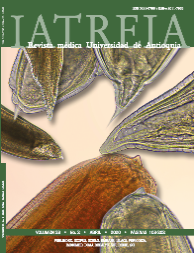Fitness: healthy lifestyle or biopolitics on body from neoliberal rationality
DOI:
https://doi.org/10.17533/udea.iatreia.48Keywords:
human body, life style, medicine, public healthAbstract
Inside Public Health and Medicine have been ignored important considerations about philosophy of technique in lifestyles and fitness. This has meant that such notions be linked to individualistic perspectives where a social vacuum is highlighted. In this paper we present a reflection about Body Improvement Technology. This construct seeks to highlight the articulation of technical, discursive, symbolic and political elements in the social production of the body, especially in the field of fitness and healthy lifestyles. We carry out a conceptual development of these terms in order to make explicit the political mechanism that mobilizes them. This work is important for Public Health and Medicine insofar as it allows us to investigate the individualist conceptions underlying the notion of lifestyles, linking them to broader biopolitical forces that operate within the neoliberal agenda.
Downloads
References
(1.) Rose N. Políticas de vida. Biomedicina, poder y subjetividad en el siglo XXI. La Plata: UNIPE editorial Universitaria; 2012.
(2.) Foucault M. Tecnologías del yo y otros textos afines. Barcelona: Paidós; 1999.
(3. Foucault M. El nacimiento de la biopolítica. Curso en el Collège de France (1978-1979). Buenos Aires: Fondo
de cultura económica; 2008.
(4.) Foucault M. “La gubernamentalidad”. En: Estética, Ética y Hermenéutica. Obras esenciales, Volumen III”. Barcelona: Paidós; 1999. p. 175-97.
(5.) Canguilhem G. El conocimiento de la vida. Barcelona: Anagrama; 1976.
(6.) Dean M. Governmentality: power and rule in modern society. London: Sage Publications; 1999.
(7.) Latour B. Reemsamblar lo social: una introducción a la teoría del actor-red. Buenos Aires: Ediciones Manantial; 2008.
(8.) Mauss M. Sociología y antropología. Madrid: Tecnos; 1979.
(9.) Le Breton D. Antropología del cuerpo y modernidad. Buenos Aires: Nueva Visión; 2002.
(10.) Estrada D. Hacia una fenomenología de la enfermedad. Iatreia. 2012;25(3):277-86.
(11.) Butler J. Cuerpos que importan. Sobre los límites materiales y discursivos del cuerpo. Barcelona: Paidós;2002.
(12.) Heidegger M. La pregunta por la técnica. En: Filosofía, ciencia y técnica. Santiago de Chile: Editorial Universitaria; 1999. p. 111-48.
(13.) Frankford D. Scientism and economism in the regulation of healthcare. Journal of Health policy and law. 1994;19(4):773-99.
(14.) Potter V. Bioethics. Bridge to the future. New Jersey: Prentice-hall; 1971.
(15.) Beauchamp T, Childress J. Principios de ética biomédica. Barcelona: Masón; 1999.
(16.) Mykhalovskiy E, Weir L. The problem of evidence based medicine: directions for social sciences. Soc Sci Med. 2004;59:1059-69. DOI 10.1016/j.socscimed.2003.12.002.
(17.) Armstrong D. The rise of surveillance medicine. Sociol Health Illn. 1995;17(3):393-404. DOI 10.1111/1467-9566.ep10933329.
(18.) Martínez O. La epidemiología en busca de contexto social. Acta Med Colomb. 2012;37(2):93-6.
(19.) Lexico Oxford [internet]. Reino Unido: Oxford University; 2016. [Consultado 2018 nov 11] Disponible en: https://cutt.ly/nrRDSQT
(20.) Cardona Arias J. Determinantes y determinación social de la salud como confluencia de la salud pública, la epidemiología y la clínica. Arch. med. (Manizales). 2016;16(1):183-91.
(21.) Espinal C. Tecnologías de optimización corporal. Biopolítica y subjetividad del cuerpo-especie en la racionalidad neoliberal [Trabajo de grado para optar por el título de Magister en Gestión Tecnológica]. Medellín: Universidad Pontificia Bolivariana; 2018.
(22.) Castro-Gómez S. Historia de la gubernamentalidad. Razón de Estado, liberalismo y neoliberalismo en Michel Foucault. Bogotá: Siglo del hombre editores; 2010.
(23.) Braidiotti R. Transposiciones. Sobre la ética nómada. Barcelona: Gedisa; 2009.
(24.) Laval C, Dardot P. La nueva razón del mundo. Ensayo sobre la sociedad neoliberal. Barcelona: Gedisa; 2013.
(25.) Moreno Pestaña J. La cara oscura del capital erótico. Capitalización del cuerpo y trastornos alimenticios. Madrid: Editorial Akal; 2016.
(26.) Foucault M. Historia de la sexualidad 1: La voluntad de saber. Madrid: Siglo XXI Editores; 2007.
(27.) Williams R. Un vocabulario de la cultura y la sociedad. Buenos Aires: Nueva Visión; 2003.
(28.) Díaz A. Tamaño del mercado de la industria mundial de los gimnasios desde 2009 hasta 2016 (en miles de millones de dólares) [internet]. [Consultado 2019 Abr 15]. Disponible en: https://cutt.ly/Wevx6zu
(29.) Conrad P. The medicalization of society. On transformation of human conditions into treatable disorders. Baltimore: Johns Hopkins University Press; 2007.
Published
How to Cite
Issue
Section
License
Copyright (c) 2020 Universidad de Antioquia

This work is licensed under a Creative Commons Attribution-NonCommercial-ShareAlike 4.0 International License.
Papers published in the journal are available for use under the Creative Commons license, specifically Attribution-NonCommercial-ShareAlike 4.0 International.
The papers must be unpublished and sent exclusively to the Journal Iatreia; the author uploading the contribution is required to submit two fully completed formats: article submission and authorship responsibility.














